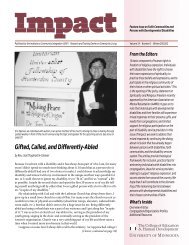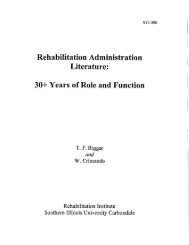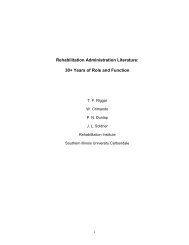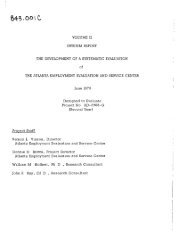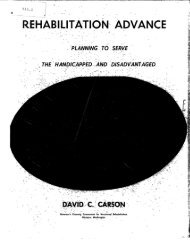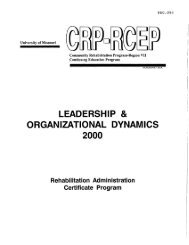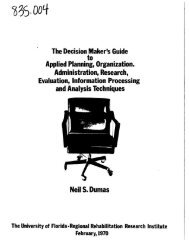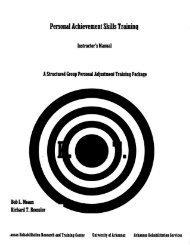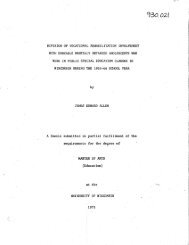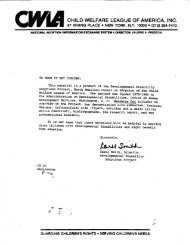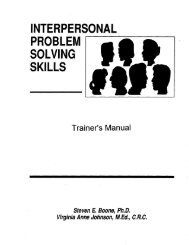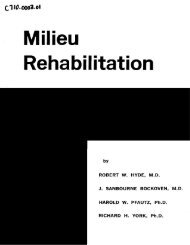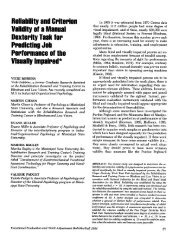Meeting Global Deaf Peers, Visiting Ideal Deaf Places ... - NCRTM
Meeting Global Deaf Peers, Visiting Ideal Deaf Places ... - NCRTM
Meeting Global Deaf Peers, Visiting Ideal Deaf Places ... - NCRTM
Create successful ePaper yourself
Turn your PDF publications into a flip-book with our unique Google optimized e-Paper software.
DEAF WAYS OF EDUCATION LEADING TO EMPOWERMENT<br />
Of course, oppressors aim to continue<br />
their domination, and the combination<br />
of the banking concept of<br />
education and paternalism has proved<br />
to be a successful strategy (Freire,<br />
2005). Yet there is one thing that bank<br />
depositors seem to overlook: “The<br />
deposits themselves contain contradictions<br />
about reality” (Freire, 2005,<br />
p. 75), and therefore push oppressed<br />
people to reflection: “If men and<br />
women are searchers and their ontological<br />
vocation is humanization,<br />
sooner or later they may perceive the<br />
contradiction in which banking education<br />
seeks to maintain them, and then<br />
engage themselves in the struggle for<br />
their liberation” (Freire, 2005, p. 75).<br />
Edward (translated interview, 2005),<br />
another Flemish deaf leader who<br />
joined in the Gallaudet trip, reflected<br />
on his school time:<br />
When I was in the first class in X [a<br />
deaf school], I was in a group of peers.<br />
There were six of us. Two students experienced<br />
difficulties; they were a bit<br />
behind. I was bored all the time. Then<br />
I said, “Oh, come on,” and the teacher<br />
replied that I had to be patient, tolerant.<br />
It was easy for him to say that, but<br />
I was sitting there all the time twiddling<br />
my thumbs. Half an hour later, I<br />
was really fed up: I attended school<br />
because I wanted to learn, not because<br />
I wanted to sleep. I got into a serious<br />
argument with the teacher. I<br />
said, “I’d better stay at home.” The<br />
teacher got really mad and sent me to<br />
the director. I didn’t care. So, I went<br />
to X [the director] and he said, “The<br />
teacher told me that you have to calm<br />
down a bit.” “Me? Calm down? Why do<br />
I attend school?” The director used to<br />
say that we all go to school to learn.<br />
So . . . he couldn’t really say something.<br />
. . . Then the class was split up<br />
in two groups and then I developed<br />
better. Oh, that was impossible, splitting<br />
up the class, that was really not<br />
14<br />
possible. Until they started to think,<br />
and then things changed.<br />
As Vincent and Edward emphasized,<br />
they had a lot of questions before.<br />
As searchers, they noticed the<br />
contradictions in the system, and<br />
their “subjugated [deaf] knowledges”<br />
(Pease, 2002, p. 33) told them that<br />
something was wrong. Yet Vincent<br />
stressed that he was not able to find<br />
the answers himself. As paternalism<br />
and oralism blocked any information<br />
that included the perception that deaf<br />
people were an ethnolinguistic minority,<br />
and they themselves did not<br />
have access to majority society and<br />
the liberating rhetoric developed in<br />
other minority groups, deaf people<br />
needed to come into contact with<br />
their signing peers from abroad in order<br />
to acquire deaf cultural rhetoric<br />
and become empowered. The alternative<br />
to banking education is dialogue<br />
(Freire, 2005). Dialogue, questions<br />
and answers, and discussions are core<br />
themes in the life stories. Passivity and<br />
acceptance are replaced by critical<br />
thinking (Freire, 2005). Starting from<br />
the concrete reality of the Flemish<br />
everyday experience, and the confrontation<br />
with a better reality in deaf<br />
dream worlds, dialogue will wake up<br />
Flemish deaf people. The world is no<br />
longer something outside deaf people’s<br />
lives, but becomes a world that<br />
can be changed and in which deaf<br />
people actively participate (Freire,<br />
2005). Jerry (translated interview,<br />
2004), a Flemish deaf leader, reflected<br />
on this process, which he experienced<br />
when he met empowered deaf<br />
people in Denmark and at Gallaudet:<br />
Then there was a study trip to Denmark.<br />
The first day of our trip, my<br />
eyes opened several times. It was already<br />
enough for me. It was too<br />
much for me to deal with. After that,<br />
X set up another study trip to Gal-<br />
laudet. That was a 5-day trip, 1 week.<br />
I joined. Then I started to feel, “Oh,<br />
actually I lost many years.” Then it all<br />
started.<br />
Back in Flanders, I was really<br />
strong. I had changed. Then I became<br />
really active. . . . Also, I will<br />
never forget that—I was on my honeymoon<br />
in the south of France. I was<br />
young and we were married. And<br />
then there were two people: “Are you<br />
deaf too?” “Yeah, we are deaf too.”<br />
Those people were Americans. That<br />
was a smart man. Very interesting.<br />
The things he told! He signed very<br />
relaxedly. And I looked and looked<br />
. . . with my mouth open. At night, in<br />
bed, I couldn’t sleep. It swirled<br />
around in my head. Oh, that was<br />
such an interesting man! There are<br />
deaf people who can do that! That<br />
man is an interesting deaf man! That<br />
is possible! I wanted to turn myself<br />
into an interesting deaf man too; I<br />
had to. Because of those people I<br />
met, always because of those people<br />
I met. And afterward I was thinking,<br />
and I realized, “I can do that too!”<br />
The school had never showed me: I<br />
can do the same things.<br />
It is only through meeting deaf<br />
adults who were smart that I started<br />
thinking and got the feeling, “I would<br />
like to become the same! I am<br />
strong! I can do that too!.” . . . We had<br />
direct communication, we had eye<br />
contact, and in 1 hour I grabbed so<br />
much information. . . . And then, at<br />
the deaf school, it took me so long<br />
for that. Through signs, I understood<br />
everything easily, and I let it all come,<br />
absorbed it all.<br />
Flemish deaf people, lacking<br />
strong Flemish deaf cultural identities,<br />
and sharing transnational commonalities<br />
of deaf lives in a hearing<br />
world (Murray, in press), easily connect<br />
with empowered deaf people<br />
from abroad. This also illustrates the<br />
VOLUME 152, NO. 1, 2007 AMERICAN ANNALS OF THE DEAF



